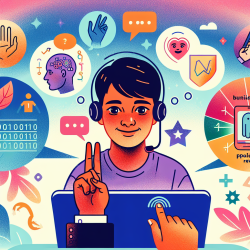The Juntos program, developed to support families impacted by Congenital Zika Syndrome (CZS) in Brazil, offers invaluable insights for speech-language pathologists and other practitioners. This blog will explore key findings from the research article "Juntos: A Support Program for Families Impacted by Congenital Zika Syndrome in Brazil" and discuss how these findings can enhance therapeutic practices.
Key Takeaways from the Juntos Program
The Juntos program is a community-based family support initiative adapted from an existing program for children with cerebral palsy. Here are some critical aspects of the program that can inform and improve therapeutic practices:
- Use of Expert Mothers as Facilitators: The program employed mothers of children with CZS as co-facilitators, alongside allied health professionals. This approach can foster a sense of community and shared experience among participants, enhancing engagement and support.
- Fast-Track Learning: Real-time feedback from participants was used to adjust and refine the program continuously. This iterative process ensures that interventions remain relevant and effective, a strategy that can be applied in various therapeutic settings.
- Integration of Emotional Support: Emotional well-being was a core component of the program. Integrating psychosocial support into therapy sessions can provide a holistic approach to care, addressing both the emotional and developmental needs of children and their families.
Implementing Juntos Program Insights
Practitioners can leverage the insights from the Juntos program to enhance their therapeutic approaches. Here are some practical steps:
- Engage Caregivers as Co-Facilitators: Involving caregivers in the therapeutic process can provide valuable insights and foster a supportive community. Consider training and involving experienced caregivers in your programs.
- Adopt Fast-Track Learning: Implement a feedback loop to gather real-time insights from participants and make necessary adjustments to your interventions. This approach ensures that your therapy remains effective and responsive to the needs of your clients.
- Incorporate Emotional Support: Integrate activities that address emotional well-being into your therapy sessions. This can help create a more comprehensive and supportive environment for both children and their families.
Encouraging Further Research
The success of the Juntos program highlights the importance of continuous research and adaptation in therapeutic practices. Practitioners are encouraged to explore further research on community-based interventions and their impact on child development. Staying informed about the latest research can help practitioners implement evidence-based strategies that improve outcomes for children with developmental disabilities.
To read the original research paper, please follow this link: Juntos: A Support Program for Families Impacted by Congenital Zika Syndrome in Brazil.










